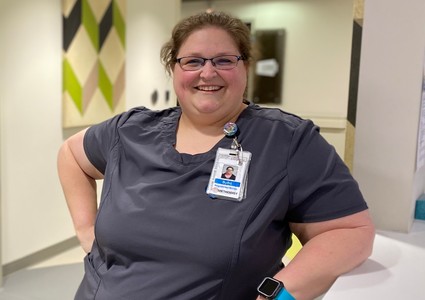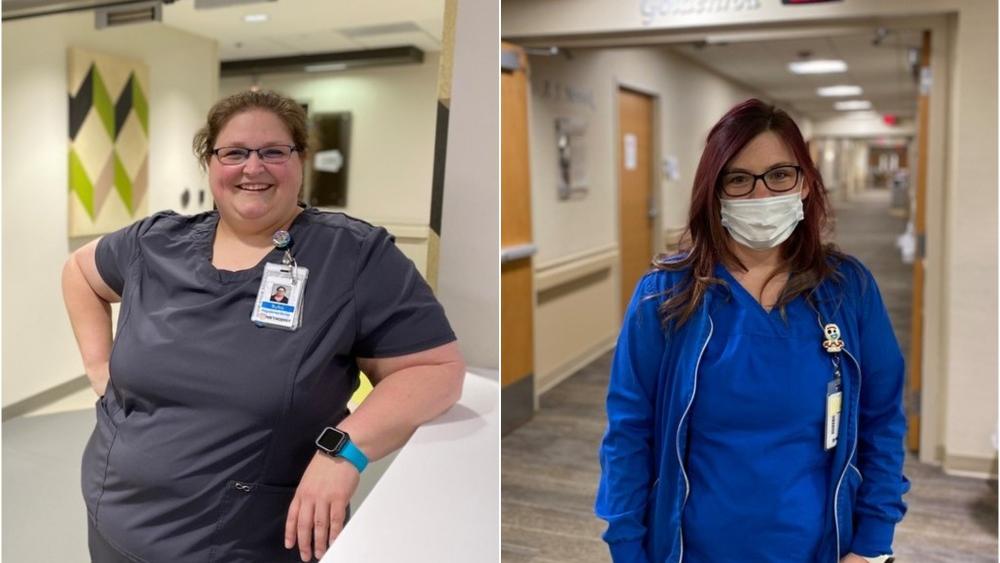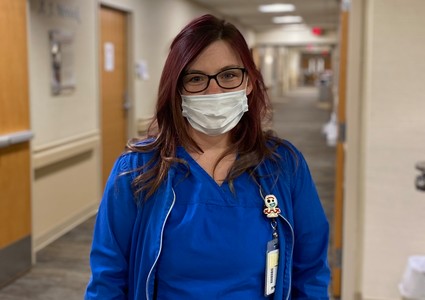





Fremont Nurses Reflect on Highs and Lows of Being New RNs During COVID-19
Published: April 19, 2021

Even the most seasoned health care workers have been pushed to their limits by the COVID-19 pandemic. Whether it’s caused feelings of fear, frustration and helplessness – or resilience and pride – the pandemic has made its mark on all of them.
For caregivers like Sybil Porter, RN, and Erin Kreikemeier, RN, the challenges came during an already demanding time – as they were taking the next step in their careers as registered nurses (RNs) at Methodist Fremont Health.
The Path to Nursing
Porter didn’t always know she wanted to be a nurse. In fact, she had no idea what she wanted to do when she graduated high school. On her mother’s advice, she took classes to become a certified nursing assistant (CNA). Before long, though, she knew she had found her calling.
“I love working in health care because I love being around people,” she said. “People are my saving grace. I like taking care of them in good times and bad times and just being a part of their life, even if it’s just for a small glimpse. Other people heal you more than you realize.”
Porter spent 14 years as a licensed practical nurse (LPN) before becoming an RN and joining the ICU and medical/surgical teams at Methodist Fremont Health Hospital in April 2020.
Kreikemeier was drawn to health care earlier in life – “I’d always kind of helped take care of family members when they got sick,” she said. She was also inspired by several nurses in her family and a good friend who worked her way through high school and college to become a nurse while raising a child.
Kreikemeier became a certified medication aid in 2018 at Dunklau Gardens, a facility on the Methodist Fremont Health campus that offers short-term rehabilitation services, long-term care and hospice care. After passing her boards in the summer of 2019, she began her new role as an RN at Dunklau Gardens.
Her education and training had given her a strong foundation, but uncertainty crept in last spring as the pandemic unfolded.
“When we first started to get patients who had COVID, it really made me scared,” said Kreikemeier, who learned in April that she was expecting her fifth child. “What did I get myself into? COVID wasn’t understood. It was super scary to go to work and come home and wonder, ‘Did I just bring it home to my family? Is this the right career for me?’ Because now I’m putting my family in jeopardy doing my job. It made me kind of scared to hug my kids or do anything, take them anywhere.”

Facing the Unknown
Being a new nurse was challenging enough before COVID-19.
Now the unknowns of the disease and evolving treatments added an extra layer of constant stress. When she was assigned to care for COVID-19 patients in isolation, Porter found herself isolated as well. She knew she could count on her team for support and guidance, but there was the natural hesitation to approach others you may not know well. Even when she did, they may not have answers. With COVID-19, no one did.
“It definitely takes a toll on you,” said Porter, a mother of three. “Lots of days you come home and you’re exhausted. It’s a whole new level of not just physical exhaustion, but also emotional exhaustion. And then you feel like you can’t give any of yourself to your family because you’re just so exhausted. It’s hard to come home and be thankful for what you have knowing what people are losing at the hospital.”
Porter thrives as a nurse because of her connection with patients, but what she saw many of them going through was heartbreaking.
“Just the sheer desperation that they had,” she said. “The fear of the unknown. They didn’t know if they were going to be better or worse the next day, or the next hour.”
Bittersweet Duties
As health care facilities limited and suspended visitor policies during the pandemic, nurses like Porter and Kreikemeier took on the task of helping families communicate with their loved ones. Sometimes it’s meant troubleshooting computer and phone issues. Other times it’s meant speaking for patients who were unable to themselves.
“Sometimes I’m very happy to do it and be that voice that they can’t be at that time,” Porter said. “Other times it’s hard. It’s hard to have to call the family and say, ‘This is what your loved one wanted me to tell you because they can’t say it themselves.’ It’s not always easy, but if that’s what’s going to be best for my patient, I’m happy to do it.”
At Dunklau Gardens – like so many other nursing home facilities – staff got creative to help loved ones connect.

“We’ve done a lot of window visits,” Kreikemeier said. “It’s amazing and heartbreaking at the same time because there’s this piece of glass sitting between them and the family member. And when the family leaves and we take them away from the window, you see the tears, because they just want to hug them. They just want to see them and talk to them.”
Staff and residents also found new joy in simple things, like the arrival of care packages.
“That was my favorite,” Kreikemeier said. “It always felt like Christmas. I get to be Santa Claus, dropping off packages that just made people grin from ear to ear.”
Feeling Complete
For all its challenges, the COVID-19 pandemic has only strengthened Porter’s and Kreikemeier’s commitment to health care. Porter was recently accepted into Nebraska Methodist College’s RN to MSN program to become a nurse educator. Kreikemeier wants to become a nurse practitioner, focusing either on obstetrics or family medicine.
Looking back on the past year reminds both nurses that they were exactly where they needed to be, finding light in the darkness and strength in themselves and those around them.
“We’ve had those really hard cases where everybody put their heart and soul, their blood, sweat and tears into it, and it was a really poor outcome,” Porter said. “But then you have those cases where you put in your blood, sweat and tears – lots of tears – and they do OK. They’re still not ever going to be who they were before they had this virus, but they’re just thankful to still be alive. And knowing that you had some part in that definitely keeps you going.”
Said Kreikemeier: “Being that support for the people who were sick and were just as scared as I was – being able to talk with them, laugh with them and try to keep their spirits up was really rewarding. I kind of felt complete because I was doing what I knew I needed to. As a nurse, I think you sacrifice a lot, but you also get a lot back in return.”
More Resources
- Read more inspiring stories of Methodist patients and staff.
- Read more articles related to COVID-19.
- Follow Methodist on Facebook, Twitter and Instagram.


